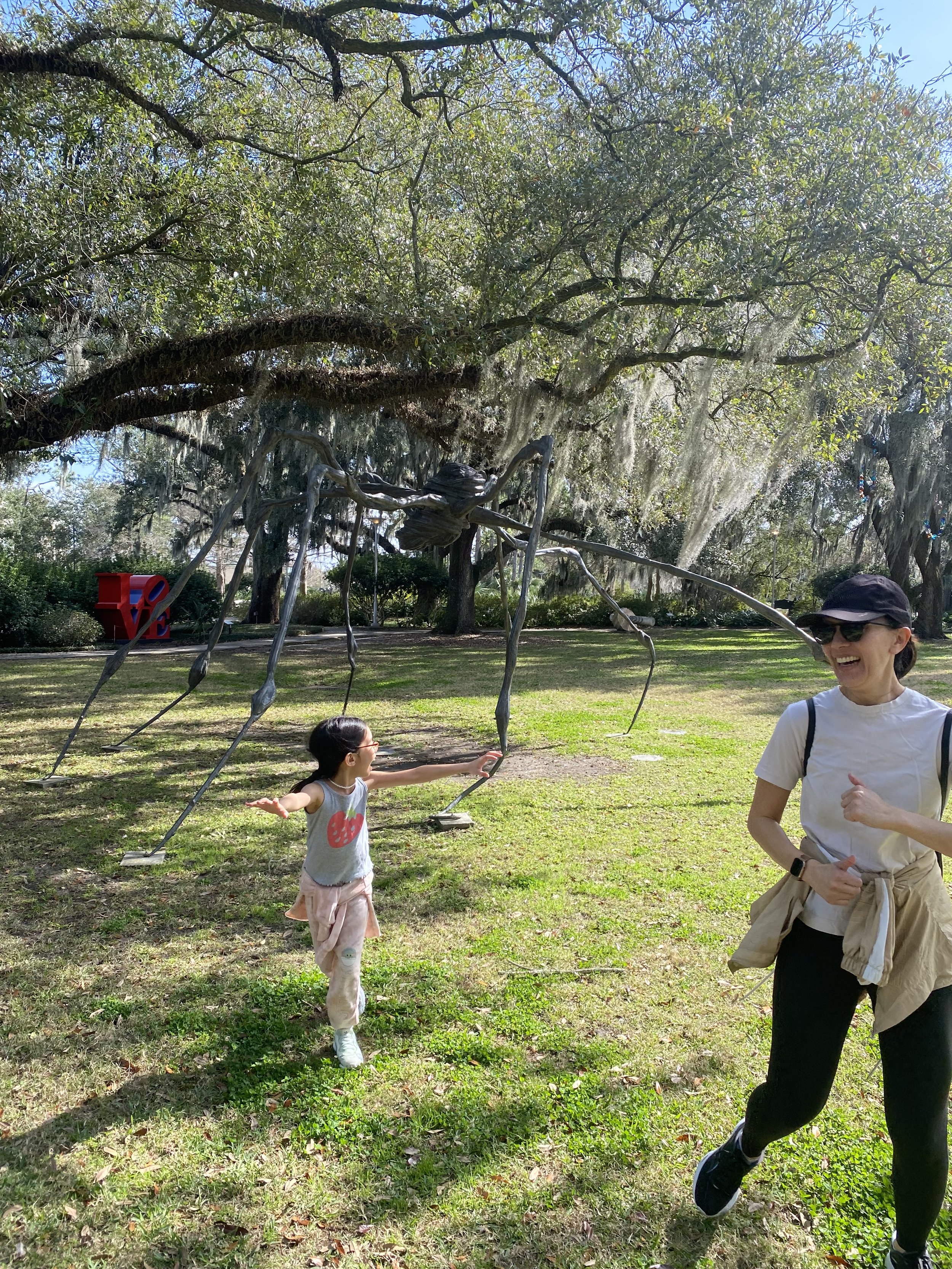What My Southern Accent Taught Me
My ancestors lived on the other side of the world in the mountainous terrain of Vietnam. Inevitably, I adopted their physical features. They passed down their jet-black hair, low nasal bridges, and large double eyelids. War unmoored my parents from their anchors and forcefully pushed them to the Southern parts of the U.S. In Hattiesburg, Mississippi, I was raised with a Southern accent and Southern habits. In my American pursuit I moved to New York, and while I’ve learned to code switch, my soul speaks with a drawl. When I let go and fall comfortable, my vowels grow wiiiiide and my words have no firm endings. Fortunately, the thick Southern wind and the caressing limbs of Spanish Moss live within me until.
My cousin and aunt under Spanish Moss in New Orleans’ Audubon Park.
My understanding of the South grew, but not in an instant. Abby, my older sister, has always been the smallest of the bunch with a zing of personality to balance out her proportions. She was captain of our Oak Grove High School debate team and as her younger sister, I wanted to dance to her every beat and embody what I figured was the epitome of cool. She had no Southern accent, while I did. She would always correct my grammar. “My. Not Maaahh,” she would say to me. “It’s pronounced would have. Not woulda,” she would preach. From this, I developed a hunch that having a Southern accent wasn’t something to be proud of. I joined Speech and Debate in high school, competed, and befriended debaters all over the U.S. Each debater spoke with alertness and a diction that the Southern accent lacked. The Southern accent, slow and lazy like a Sunday afternoon can be juxtaposed with “the debaters’ accent: sharp, witty, convincing, sure not to waste a single breath.
While there were other Southerners dominating debate rounds, “being Southern'' was looked down upon even within our own microcosm. Unintentionally I found myself able to turn on the Southern accent when I needed the charm and turning it off when I was in a meeting or speaking to customer service–code switching. Between those two worlds however, my identity and ego felt best when I spoke with a clear, concise, intentional, and seemingly more educated tone of voice.
The night of my first debate competition during my Freshman year of high school
Calling Mississippi home, I knew, was going to be temporary. I was practically clawing my way out as soon as I came out of the womb. Growing up in a small community, I realized quickly that I would never look like my peers which molded me into a person that finds beauty in outliers, underdogs, and losers on winning streaks. The sheer idea of living somewhere like New York was just as comforting as actually doing it. Without concern, I left home.
After moving, homesickness seeped through each limb and my whole center. The sun that shone through the Spanish Moss was nonexistent. The Southern accent I resented for a period of my life was hushed—I even missed my own. I couldn’t exist with a Southern accent. “Crawfish” was now “crawdads" and a road less traveled wasn’t synonymous with “the backway.” I thought of how Northerners would look down on me if I had a Southern drawl and all the jobs that wouldn’t hire me based on perception. These insecurities led me to think of my parents and how they experienced being thrown into the depths of an unknown world at ripe ages.
My dad Phong Nguyen grew up as a street rat. He roamed Ho Chi Minh city in his beat up, open toed sandals and stained white t-shirt. He skipped class and instead played marbles with the monks at the Buddhist temple down the street. He dove head first into the Saigon River right after his dad blatantly said not to. Meanwhile, he was smart, witty, street savvy and knew how to survive. He was the real world Aladdin. When he moved to America, his accent casted a shadow on his character.
I remember my dad asking my sister to order food for us at every drive-thru. My dad, the entertainer and socialite of the Vietnamese community, the one who was chosen to speak at almost every single loved one’s funeral is not one to shy away from a task like ordering a Big Mac with fries. So, why is it that an accent, a simple change in tone and inflection strips someone of their intelligence and personality?
The day my dad immigrated to the United States.
I remember my mom speaking into Siri's voice-to-text feature and getting frustrated at the incorrect translations. While we laugh about these moments, I grew up with the notion that how others perceive you, based on the way you speak, can be a privilege or a strike against your character.
Code switching is a tool for navigating a dominant culture. In author Ocean Vuong’s On Earth We’re Briefly Gorgeous, the narrator writes to his mother, “I code switched. I took off our language and wore my English, like a mask, so that others would see my face, and therefore yours.” While code switching does share negative connotations, code switching has been a privilege and a way of survival that has become accessible through generations.
Cover of On Earth We’re Briefly Gorgeous A Novel by Ocean Vuong, cover art by Sam Contis (Embrace, 2015)





